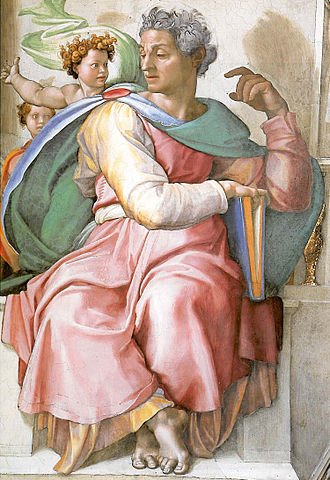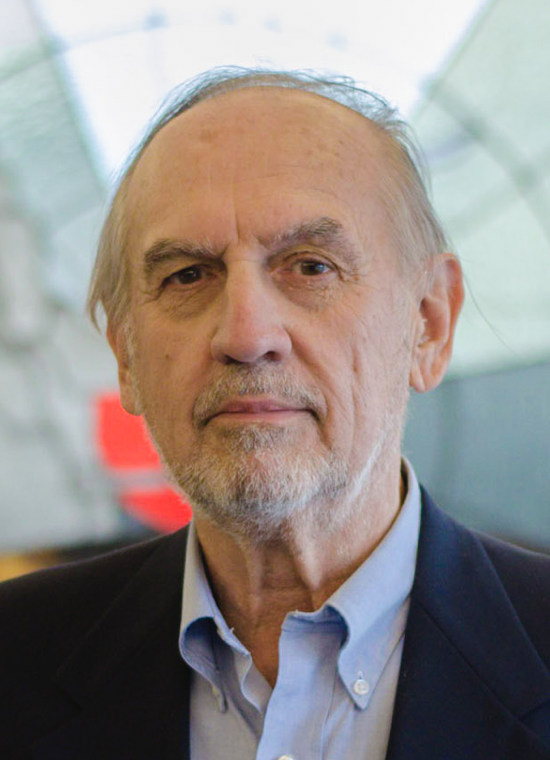Cross View Blog
When A Prophet Speaks

Fresco from the Sistine Chapel ceiling by Michelangelo (1510)
The primary role of a biblical prophet is to speak for God. The prophet is given his message directly from God's Spirit; the prophet does not write his own stuff. The message may contain impending judgment and/or comforting encouragement. The prophecy may also be predictive of the future, but not necessarily so. If the prophet's words come true, it is a confirmation of his authority to speak for God. However, if his words are not fulfilled, he should be considered a false prophet.
Among the greatest and most eloquent of Old Testament prophets was Isaiah (8th and 7th Century B.C.). He surpasses even such towering figures as Moses, Samuel, David, Jeremiah, and Ezekiel. He is quoted in the New Testament more than any other prophet, even by Jesus himself while dying on the cross.
The Gospel of Mark begins with a direct quote from Isaiah 40 describing John the Baptist as a messenger preparing a road for the LORD in the wilderness, making his way straight and level. This "human bulldozer" is honored by Christ as "the greatest of all prophets" because he prepares people to receive the Son of Man, the God-Man who is the very expression of the Word.
In this passage, Isaiah speaks a word of tender comfort and mercy to miserable and discouraged Israel barely surviving in Babylonian exile. The prophet tenderly comforts the disturbed and oppressed in a foreign land. The exiles had lost hope and faith in their rescue. They felt Jahweh had abandoned them.
Previously, Isaiah had excoriated these same people for their idolatry and faithless behavior. He pulls no punches and hits them and their enemies with dreadful "woes." As a true prophet and not a politician who worries about "offending" his hearers, Isaiah speaks the unvarnished truth. Prophets don't worry about their popularity. They don't read the polls before they speak.
Someone has said, "A prophet comforts the disturbed and disturbs the comfortable." This begs the question: if Isaiah were to speak today, what might his message be?
I believe Isaiah would say to those who are comfortable in their own righteousness, "Woe to you who trust in your own righteousness! Woe to you who are arrogant! Woe to you who oppress and judge others! Woe to you who make God in your own image! Woe to you who despise His Word and worship what you see and hear and think! "
The prophet does not care whom he offends because they have already offended God with their comfortable attitudes. John the Baptist preached blunt repentance and let the results up to God.
On the other hand, Isaiah would comfort those who mourn, those who seek mercy and forgiveness. He would comfort them by reminding them that The Messiah has suffered doubly for their sins, that their iniquity has been pardoned. He would impart words of peace and healing to broken hearts and broken lives. He would be a beacon of hope in a hurting, hating and fearful world. Some people he would disturb in their self-satisfaction; others he would comfort in their distress.
As individuals, all of us continually need "attitude adjustments." We all wander from the straight and narrow path and go our separate ways. We are all - without exception - lost sheep without a shepherd. There is not one person who can claim to be righteous.
Thus, we all need to hear the voice of the prophet speaking through his servants, sometimes quietly with good deeds; other times loudly and boldly. Sometimes the prophet must speak offensive and irritating words; other times sweet and tender words. The prophet speaks as he is moved by God.
When a prophet speaks, he will be persecuted. Jesus warned his disciples that they would be persecuted just as all Old Testament prophets were persecuted. John the Baptist literally "lost his head" speaking the truth to power. The Son of Man himself was crucified for speaking the truth to power. His disciples died as martyrs to the truth. Prophets are persecuted because they challenge the fundamental assumptions and values of the world. The truth is intolerable because it upsets and disturbs their comfortable dogmas.
In summary, let us be disturbed in our comfortable, self-centered attitudes, and let us also be comforted in our hunger for mercy in our suffering COVID world.
In the midst of Advent, we turn off the ceaseless noise of the world and listen to that still small voice that speaks the truth. And behold, the truth sets us free. That is the role of the prophet and that is what happens when he speaks.
 Paul Emmel is a retired pastor in the Lutheran Church - Missouri Synod, having served as a parish pastor, a correctional chaplain for the Wisconsin Department of Corrections, and a hospital chaplain and a community counselor. As a retired pastor, Paul continues to serve the Lord and His people, including establishing the Minnesota South District’s “Pastors to Prisoners” ministry.
Paul Emmel is a retired pastor in the Lutheran Church - Missouri Synod, having served as a parish pastor, a correctional chaplain for the Wisconsin Department of Corrections, and a hospital chaplain and a community counselor. As a retired pastor, Paul continues to serve the Lord and His people, including establishing the Minnesota South District’s “Pastors to Prisoners” ministry.
